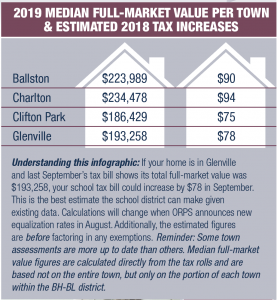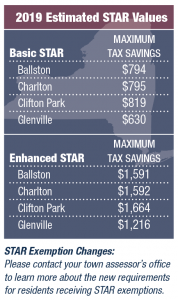What happens if voters do not approve the proposed budget?
If the proposed budget is defeated, state law gives the Board of Education two options:
- Resubmit the same or revised proposal for a revote or
- Move directly to a contingent budget.
If voters defeat the proposal a second time, however, the board must adopt a contingent budget.
Rules more severe now
Under New York’s tax cap law, districts that adopt a contingent budget cannot increase the current tax levy by any amount—resulting in a zero percent tax levy increase.
Bringing the BH-BL tax levy increase down to zero would force the board to reduce the proposed budget by $1,160,278. In doing this, the board may not be able to adhere to its goal of preserving student programs and services or staff. It would likely have to make a number of staff reductions across all schools, which would increase class sizes.
Adopting a contingent budget prohibits a district from spending any money in certain areas, including community use of school facilities (unless all costs are reimbursed to the district); new equipment purchases; nonessential maintenance; capital expenditures (except in emergencies); salary increases for non-instructional and non-unionized employees; and certain field trips and student supplies.
Also under contingency rules, the administrative component of the budget would be subject to certain restrictions. These requirements existed prior to the tax levy cap and remain in effect.
Is there another proposition on the ballot?
In addition to the first proposition, the 2019-20 school budget, residents will also be asked to vote on a second proposition reauthorizing an ex officio student member position on the BH-BL Board of Education. By law, residents must approve this proposition every two years.
This proposition was first proposed and approved in May 2015. For the past four years, a different high school student each school year has been appointed as an ex officio member.
The student member attends board meetings, sits at the board table, and contributes to public discussions. An ex officio student member does not vote and does not attend executive sessions.
“We are a better board because we have a student voice at the table,” says Board President John Blowers. “For the past four years we’ve been able to more regularly integrate the student board member into our meetings allowing us to strengthen student-centricity in our decision making.”
How will the proposed budget impact taxes?
The 2019-20 proposed budget of $69,548,408 is 2.15 percent higher than the current year’s budget. Given the state aid BH-BL will receive and other revenue sources, the overall property tax levy will increase 2.90 percent in order to balance the proposed budget.
Equalization rates
Calculating tax rate increases is complicated by the fact that the BH-BL district is made up of parts of four towns—Glenville, Charlton, Ballston Lake, and Clifton Park.
Each year, tax rate increases vary from town to town due to equalization rates that the New York State Office of Real Property Services (ORPS) announces in August.
As the name implies, equalization rates are intended to spread the tax burden across the four towns as fairly as possible. The rates attempt to “equalize” or compensate for differing assessment practices, for the fact that one town’s assessments may be more recent than the other towns’, and for the fact that property values don’t change equally in all towns within the school district.
For instance, if ORPS determines that property values have risen more in one town than another in the past year, the tax increase in that town may be somewhat higher than the estimated 1.95 percent average for 2019-20, while the rate in another town may be lower than the average.
Equalization rates are typically not shared with school districts until August. Equalization rate differences tend to even out over several years, but they make it impossible to predict actual tax rate increases in each town.
The school district plays no role in determining what portion of the tax burden is placed on any one town or any one property owner.
The state ORPS office sets equalization rates that determine the portion of the total tax levy paid by each town, and the assessor in each town calculates individual assessments that determine how much is paid by each property owner.
Are there any exemptions available to help taxpayers?

Yes. Homeowners can receive property tax exemptions under the School Tax Relief (STAR) program. Under state law, STAR exemptions can now grow by only 2 percent per year.
The Basic STAR exemption is available on a homeowner’s primary residence for anyone who owns and lives in his/her own home and earns less than $500,000 a year.
The Enhanced STAR exemption is available on the primary residence of taxpayers age 65 and older with yearly incomes of $86,300 or less.
Other tax relief options
BH-BL residents over the age of 65 with incomes of $37,400 or less also can be exempted from paying school taxes on 5 to 50 percent of their home’s assessed value depending on their exact income. The district also grants a disability exemption, ranging from 5 to 50 percent, for qualifying residents of any age with disabilities and incomes of less than $37,400.
Last year, the board adopted the Alternative Veterans’ Tax Exemption at level 1, which allows qualifying veterans to be exempted from paying school taxes on a portion of their home’s assessed value depending on their military service.
Applications for these district exemptions and for state STAR exemptions must be filed with your town assessor’s office. Visit your
town’s website or call your town assessor if you have questions about these exemptions.
Are new buses being purchased for next year?
Yes, but like the past few years the cost of the new buses is included in the budget proposal. Bus purchases are done this way so the district doesn’t have to borrow funds and incur debt. The proposed budget includes $830,000 for the purchase of five 66-passenger buses and three 29-passenger buses (one with a wheelchair lift) to replace some of the district’s oldest buses.
The district anticipates being reimbursed approximately 66 percent of the cost of the buses through state transportation aid in subsequent years, resulting in a net local cost of approximately $282,200.
Additionally, by purchasing buses outright, the district saves an estimated $15,000 in interest and legal fees associated with borrowing funds.
Bus replacement plan
The buses scheduled to be replaced in the 2019-20 school year are among the oldest in the district’s fleet and have already accumulated high mileage, exceeded their warranties, and undergone many maintenance repairs. Beyond certain limits, buses typically become too costly to maintain given the state’s stringent safety codes. Furthermore, new school buses are aligned with the latest safety and emissions standards and have better fuel economy rates.
BH-BL’s 69-bus fleet travels more than 700,000 miles a year, transporting more than 3,100 students to and from its five schools. The buses are also used for sporting events, out-of-district runs, shared transportation runs, field trips, summer school, and other events.
In order to keep buses in safe working order, the district’s long-standing policy has been to replace several of the oldest buses each year.

